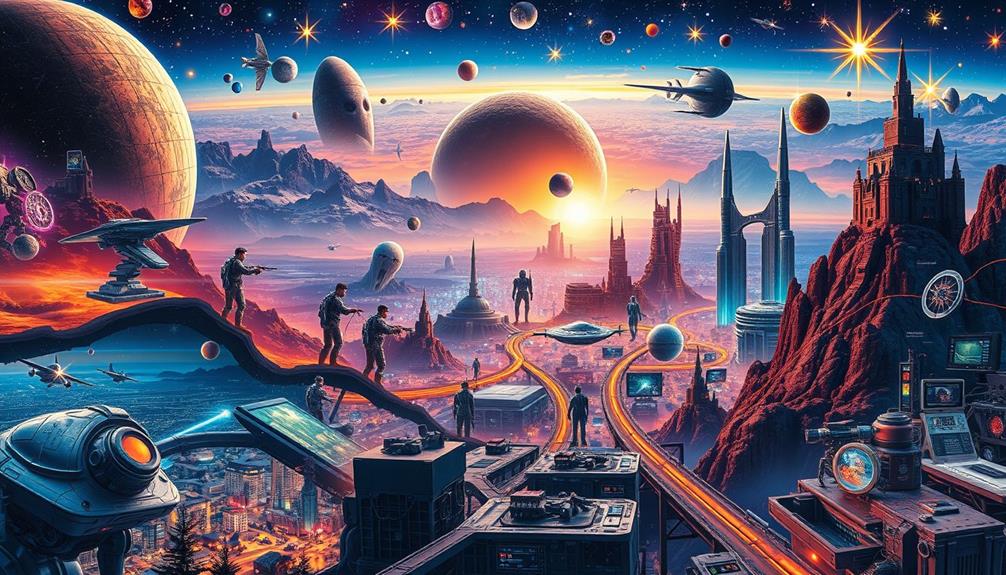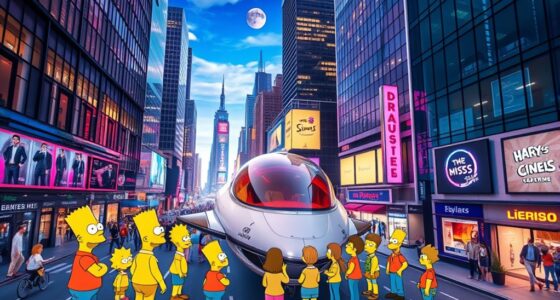The science behind your favorite sci-fi movies blends reality with imagination, creating enchanting narratives. Films like "Interstellar" incorporate complex theories such as time dilation, while others, like "2001: A Space Odyssey," realistically portray space travel. These films often reflect societal fears and aspirations, sparking conversations about ethics and technological advancements. Remarkably, they influence real scientific research and inspire innovation. As ecological crises rise, future stories will likely explore relatable themes that mirror your world. If you're intrigued, you'll find even more fascinating connections between sci-fi cinema and scientific inquiry waiting to be uncovered.
Key Takeaways
- Sci-fi films like "2001: A Space Odyssey" showcase realistic space travel, influencing aerospace engineering and public interest in space exploration.
- "Interstellar" incorporates scientific theories such as time dilation, bridging emotional narratives with complex astrophysics, inspiring research in the field.
- "The Martian" addresses practical challenges of Mars colonization, highlighting real scientific principles while engaging audiences with survival themes.
- Films like "Jurassic Park" illustrate the tension between scientific possibility and ethical dilemmas, raising awareness about genetic engineering's implications.
- Environmental sci-fi, such as "Children of Men," reflects societal anxieties about climate change, prompting critical discussions on ecological sustainability.
Definition of Science Fiction
Science fiction often blends reality with imagination, creating a genre that captivates audiences. At its core, science fiction is defined as a genre combining elements of science and fiction, often rooted in established scientific concepts while exploring imaginative scenarios beyond current reality.
You might think of iconic works like Mary Shelley's "Frankenstein," which laid the groundwork for this genre, showcasing how science fiction can investigate ethical dilemmas and the consequences of scientific advancements. This genre not only entertains but also encourages readers to engage with philosophical themes that challenge our understanding of humanity.
As you explore sci-fi, you'll notice it often blurs lines with other genres, such as horror. This blending illustrates the versatility of science fiction, allowing it to address diverse themes while maintaining a core of scientific inquiry.
With sub-genres like space opera, soft sci-fi, and sci-fi horror, the genre appeals to a broad audience, tapping into various interests and issues.
However, there's a growing expectation for science fiction to adhere to established scientific principles, leading to lively debates among fans regarding the genre's integrity. Understanding these nuances helps you appreciate the depth and richness of science fiction, making it a compelling genre in literature and film.
Scientific Accuracy in Film
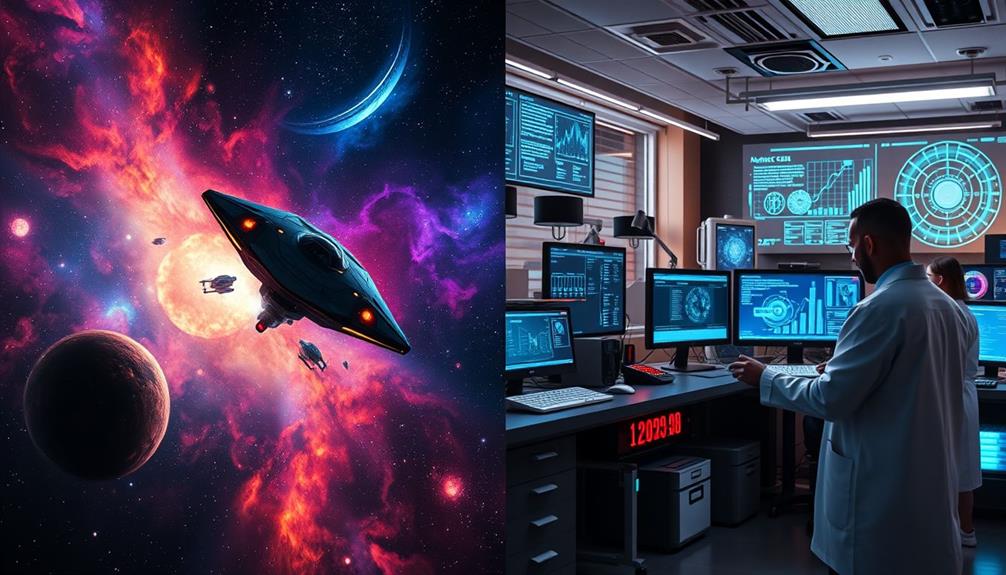
When engaging with sci-fi films, you'll quickly notice the varying degrees of scientific accuracy presented on screen. Some movies prioritize entertainment over adherence to scientific facts, leading to oversimplifications. For instance, while "Arrival" received praise for its unique take on communication, critics pointed out its flaws in language decoding. On the other hand, "2001: A Space Odyssey" is celebrated for its commitment to realistic depictions of space travel, aligning closely with actual scientific principles.
Here's a quick comparison of some notable films regarding scientific accuracy:
| Film | Scientific Accuracy | Notable Issues |
|---|---|---|
| "2001: A Space Odyssey" | High | None reported |
| "Jurassic Park" | Low | Implausibility of reviving dinosaurs |
| "Arrival" | Moderate | Language decoding inaccuracies |
Critics argue that neglecting scientific facts can undermine the credibility of the genre and contribute to public misconceptions about science. While hard sci-fi often champions scientific rigor, an excessive focus on technical details can alienate those looking for escapism, highlighting the delicate balance filmmakers must strike between storytelling and scientific accuracy.
Societal Impact of Sci-Fi

Sci-fi films often act as mirrors reflecting societal fears and aspirations, shaping public discourse around pressing issues. These films tackle current ecological and political anxieties, as seen in "Children of Men" and "The Day After Tomorrow," where the implications of climate change and resource depletion are vividly portrayed, prompting discussions about our reliance on sustainable energy sources like solar panel efficiency. They prompt you to contemplate the real-world implications of these scenarios, highlighting the urgent need for action.
Moreover, the genre encourages critical thinking about technological advancements and their ethical dilemmas. Movies like "Ex Machina" push you to ponder the consequences of artificial intelligence on human identity and morality, urging a deeper conversation about our technological future.
Sci-fi narratives also engage with themes of prejudice and societal division, with films like "X-Men" offering allegories that reflect real-world discrimination and social justice movements. By depicting speculative futures, sci-fi inspires public interest in science and technology, promoting societal engagement with crucial topics like space exploration and genetic engineering.
Ultimately, the societal impact of sci-fi lies in its uniqueness to blend entertainment with social commentary, guiding you to reflect on humanity's future and the implications of scientific progress on our collective values.
Themes in Sci-Fi Cinema

In sci-fi cinema, you'll often see themes that reflect our biggest concerns, like environmental impacts and dystopian futures.
Movies explore human-alien communication, highlighting our desire to connect and understand beyond our planet.
Additionally, themes related to advancements in technology, such as AI in Cybersecurity, challenge audiences to contemplate the implications of our innovations.
These narratives not only entertain but also challenge you to think critically about the world around you.
Environmental Impacts Explored
Environmental sci-fi films often serve as a mirror, reflecting the urgent ecological disasters humanity faces today. Movies like "The Day After Tomorrow" vividly illustrate the catastrophic consequences of climate change, pushing you to confront the realities of environmental impacts. Dystopian narratives, such as "Children of Men," resonate deeply, showcasing the potential collapse of civilization stemming from environmental neglect.
Recent studies have shown that the depiction of such crises in media can influence public perception and awareness of these issues, underscoring the importance of storytelling in shaping our understanding of reportable diseases in Germany.
As you watch these films, you can't help but feel a sense of urgency; they compel you to think critically about our relationship with nature. Near-future sci-fi increasingly explores relatable scenarios, making the themes more impactful and relevant to contemporary ecological crises.
Filmmakers are recognizing this shift, expressing a desire for fresh narratives that focus on ecological themes, which indicates a growing interest in addressing environmental challenges directly.
These stories not only entertain but also prompt you to contemplate the ethical implications of scientific advancements. They challenge you to reflect on the choices humanity faces and the legacy we leave behind.
In this way, environmental sci-fi serves as both a warning and a call to action, urging you to engage with the pressing issues of our time.
Human-Alien Communication Themes
The exploration of human-alien communication in cinema captivates audiences by delving into the intricacies of understanding beings beyond our world. Films like "Arrival" and "Contact" highlight the challenges of decoding non-human languages and the quest for connection. You see how these narratives tackle the essence of intelligence and consciousness, asking profound questions about our place in the universe.
| Film Title | Communication Method | Theme |
|---|---|---|
| Arrival | Language decoding | Nuances of understanding |
| Contact | Signal deciphering | Search for connection |
| Close Encounters of the Third Kind | Music and visuals | Emotional shared experiences |
In "Close Encounters," the importance of emotional connections shines through, showing that shared experiences can bridge the gap between species. Additionally, the depiction of communication with extraterrestrial beings often serves as a metaphor for broader societal themes, reflecting our anxieties about the unknown. Sci-fi narratives also explore technology's role in facilitating human-alien communication, presenting both optimistic and cautionary tales about humanity's future. Through these explorations, filmmakers invite you to ponder the possibilities and implications of truly understanding the "other."
Dystopian Futures Reflected
Sci-fi cinema often holds a mirror to our society, reflecting fears and concerns about our future. Dystopian themes in films like "Children of Men" illustrate the dire consequences of environmental degradation and political instability. These narratives resonate with you, showing what could happen if we ignore pressing issues today.
Much like how a holistic lifestyle can lower cholesterol levels, these films urge you to contemplate the broader implications of your everyday choices on health and well-being. Movies such as "The Day After Tomorrow" serve as cautionary tales, warning of the catastrophic impacts of climate change. You can't help but think about how our actions shape the world around us.
Meanwhile, near-future settings in films like "Blade Runner" explore the human condition under adverse circumstances, making you reflect on your own humanity amid chaos.
Additionally, dystopian cinema often critiques technology and its ethical implications. In "Ex Machina," you're led to question artificial intelligence and autonomy, provoking deep thought about the role of technology in your life.
Ultimately, these dystopian futures mirror your societal anxieties, capturing what worries you about the trajectory of humanity. By engaging with these films, you confront uncomfortable truths and ponder the potential outcomes of today's choices, making sci-fi not just entertainment, but a crucial discussion about our collective future.
Notable Sci-Fi Films and Science
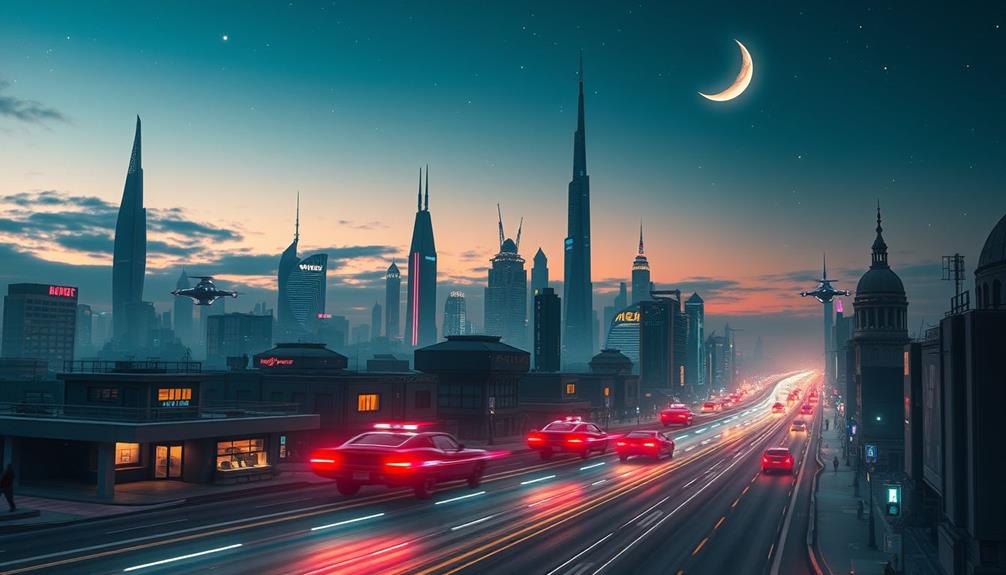
When you think about notable sci-fi films, you can't ignore how they blend scientific accuracy with imaginative storytelling.
Movies like "Interstellar" and "2001: A Space Odyssey" set a high bar by incorporating real scientific principles, including the fascinating phenomenon of sonoluminescence secrets, while others, like "Jurassic Park," spark debate over their scientific plausibility.
Additionally, films like "The Day After Tomorrow" shine a light on environmental issues, reminding you of the real-world impact of climate change.
Scientific Accuracy in Film
Numerous sci-fi films aim for scientific accuracy, creating a fascinating interplay between entertainment and real-world science. For instance, "2001: A Space Odyssey," directed by Stanley Kubrick, is celebrated for its realistic portrayal of space travel and zero gravity, influencing modern concepts in space exploration.
The integration of advanced technologies in film often mirrors real-world innovations, with some films exploring ideas akin to AI in Holistic Diagnosis and Treatment and the impact of artificial intelligence on human health. On the flip side, "Arrival" faced criticism for oversimplifying language decoding, showing how narrative can sometimes overshadow scientific accuracy in film.
Similarly, while "Jurassic Park" tantalizes audiences with the idea of reviving dinosaurs from ancient DNA, scientists deem this premise implausible due to the degradation of genetic material over millions of years.
In contrast, films like "Interstellar" manage to weave scientific principles, like time dilation, into compelling narratives that resonate emotionally with viewers. Yet, not every film strikes this balance; "Blade Runner" explores advanced technology and environmental themes but often sacrifices scientific accuracy for the sake of entertainment.
Ultimately, the pursuit of scientific accuracy in film varies widely across the genre, with some films pushing boundaries and others choosing to prioritize storytelling. This spectrum shapes how you experience and interpret these imaginative worlds.
Impact on Real Science
Several iconic films have greatly impacted real science, inspiring both public interest and academic research. These movies spark curiosity and motivate scientists to explore new frontiers, especially in the domain of space travel.
This intersection of cinema and science not only entertains but also enhances overall decision-making, as it encourages viewers to reflect on the complexities of our universe. Here are a few notable examples:
- "2001: A Space Odyssey": This film's accurate depiction of orbital mechanics has influenced aerospace engineering and spacecraft design.
- "The Martian": It highlights the challenges of human colonization of Mars, emphasizing botany and sustainable agriculture, and has shifted discussions around current space exploration.
- "Interstellar": By exploring theories like time dilation and black holes, it has inspired astrophysicists to publish real scientific research on these complex subjects.
The intersection of cinema and science doesn't just entertain; it plays an essential role in guiding research directions. Films like these serve as a bridge, connecting imaginative storytelling to tangible scientific advancements.
As you watch, remember how these narratives can shape our understanding of space travel and ignite a passion for exploration in the real world.
Curiosity drives creativity and innovation, making these films even more significant in inspiring the next generation of scientists.
Environmental Themes in Sci-Fi
Sci-fi films' ability to reflect and amplify pressing environmental issues makes them powerful tools for social awareness. These environmental sci-fi narratives encourage you to confront the ecological challenges of our time, illustrating potential futures shaped by our actions today.
Here's a quick look at some notable films and their environmental themes:
| Film | Environmental Theme | Key Message |
|---|---|---|
| *The Day After Tomorrow* | Consequences of climate change | Extreme weather events can mirror real-world issues. |
| *Children of Men* | Societal collapse due to environmental degradation | Reflects humanity's impact on ecological systems. |
| *Wall-E* | Consumerism and waste management | Warns against the perils of pollution and excess. |
These films, like *Avatar* and *Snowpiercer*, not only entertain but also provoke critical thought regarding resource exploitation and impending ecological crises. They remind you that the future of our planet hinges on the decisions we make today, making environmental sci-fi not just fiction but a call to action.
Future Trends in Sci-Fi Stories
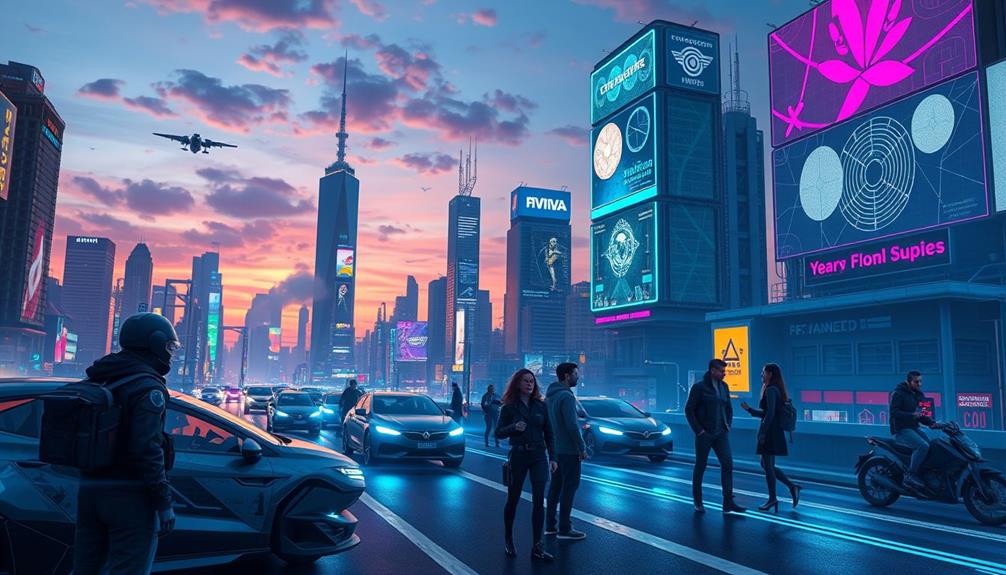
In the coming years, you'll likely see a surge in sci-fi stories that tackle ecological crises, reflecting the pressing environmental issues we face today. Filmmakers are enthusiastic to create narratives that resonate with audiences, much like the impactful themes in "The Day After Tomorrow" and "Children of Men."
With the growing interest in sustainable practices, similar to the focus on eco-friendly water activities, here are some future trends you can expect in the sci-fi genre:
- Near-future narratives: These stories will explore relatable scenarios that mirror current global challenges, making them more accessible and engaging.
- Human-alien communication: The exploration of how we might communicate with extraterrestrial beings will remain a central theme, with adaptations of classics like "Neuromancer" on the horizon.
- Technological advancements: As virtual reality and artificial intelligence continue to evolve, expect stories that incorporate these elements, enhancing immersive experiences for viewers.
With a growing demand for diverse and inclusive narratives, the sci-fi genre is set to reflect a broader range of human experiences and perspectives.
This evolution won't only enrich storytelling but also foster connections with audiences, as they see their own realities reflected in these futuristic tales.
Conclusion
As you step back from the fantastical worlds of sci-fi, it's amusing to think that while we're busy imagining interstellar travel, our planet's still grappling with traffic jams. The irony is palpable—these films spark our wildest dreams, yet we can't even teleport to work. But maybe that's the beauty of it; they remind us that while we chase the stars, our feet remain firmly planted on the ground, steering through the everyday chaos of life.

